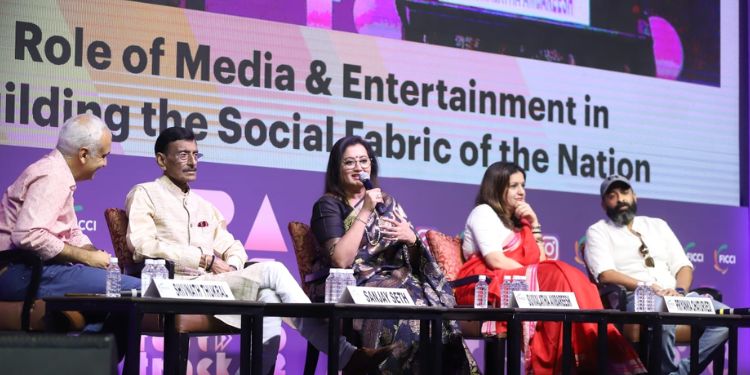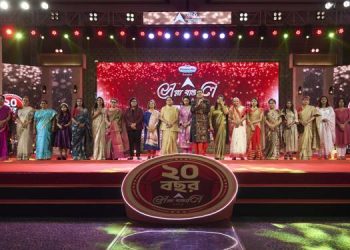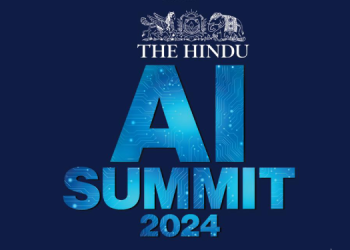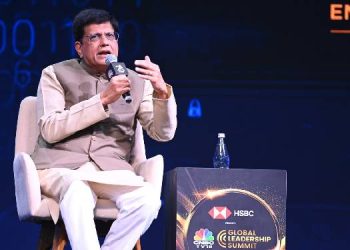The inaugural day of FICCI FRAMES Fast Track 2022 in Mumbai on September 27 saw a panel discuss the ‘Role of Media & Entertainment in building the social fabric of the nation’.
The session was moderated by Shivnath Thukral, Director of WhatsApp Inc. Public Policy India, Meta.
The panellists included MPs Sanjay Seth, Sumalatha Ambareesh and Priyanka Chaturvedi, alongside Palash Vaswani, director of the series ‘Gullak’.
The discussion commenced with a question to Vaswani on the interaction between the policy makers and Bollywood.
Vaswani responded (sic), “Being a citizen of the country and a filmmaker it is also our responsibility on what type of content we do. My content is mostly with culture and family; portrayal should be right without any kind of sensationalism created unnecessarily, staying true to the story. If I have to talk about Gullak, it’s a story about four people, mother, father and two kids.”
“Whether we are talking about girls rights or adjustments in family, we try to engage the audience with such conversations; here we also try to stay a bit responsible in what we do. A small example is, recently we had done a whole episode on Satyanarayan Puja. We ensured that nobody’s sentiments were hurt and staying true to it, we called a real pandit to explain in detail. The whole unit was shooting with their shoes kept out. We took responsibility to avoid any type of controversy like the recent one with Brahmastra. We normally do social commentary in the episode and avoid controversies,” he added.
On having freedom and yet being responsible Ambareesh observed, “Being in the movie industry since the last 40+ years and having acted in nearly 200 movies, gives me a kind of perspective as to where the movie industry is standing and where we are coming from. I tend to understand their issues far more better from their viewpoint rather than from a Parliamentarian’s view.”
India has come a long way from the days when censors restricted film makers and today there is all kinds of content available, noted the speaker.
“So I think, allow them the freedom and let them be responsible for their actions. Accountability does matter ultimately. On YouTube there is so much disturbing child porn, so a line needs to be drawn there and can’t show such kind of visuals in movies. In broader terms there needs to be some supervision but I support freedom,” he added.
Seth said, “Gullak did well during Covid. 40 years back there were serials like Hum Log, Buniyaad… after that such serials didn’t happen which could be remembered even after 40 years and the entire family could sit and watch together. Gullak brought families together and the show became a hit without any controversy. This is what the nation needs, you need to give the audience what they want and not impose on them.”
On policy makers being enablers or interventions, Chaturvedi pointed out: “I would always be on the side of enablers, creativity and creative content. You find something controversial you have every reason to not attend the screening of that content, you have the option of not logging onto the platform and watching what is spoken. You should also have self responsibility and let the government not impose policy – it should come from the industry. There are some parameters we will challenge and there might be some we might not challenge but (we will) want to work within those boundaries. Those who are challenging those boundaries will definitely have to be up for criticism.”
Boycott trend
How do creative people deal with #boycott and cancel culture?
“I seriously don’t know if one can avoid that situation in today’s day and age and looking at the trends, but I find it a very disturbing and unhealthy trend. Coming from the film industry I know the kind of blood, sweat and tears, the passion, the thought, hardwork and the number of people whose livelihoods depend on these films doing well; things like boycott culture affects the box office collection of movies. I know how heartbreaking it can be and I think it is definitely not fair,” underlines Ambareesh.
Seth remarked, “Even I don’t agree with the boycott culture but in the name of a movie if you show something wrong against religious deities or the nation, the nation won’t accept it. You can’t attack our culture. Does it happen anywhere in the world? Then how can freedom be given in India? The government just banned 45 Youtube videos as it was against the nation. Make shows like Ooltah Chashmah, Hum Log, Buniyaad which were hits – why are you attacking our culture?”
The actor-cum-politician Ambareesh pointed that the movies used to get banned earlier too, citing examples of ‘Aandhi’ and ‘The Da Vinci Code’.
In continuation, Chaturvedi observed that when ‘Aandhi’ got banned many people from the film fraternity opposed it, spoke at various platforms; there was no attack on them and thus the government released the ban under pressure, she reminded.
Role of media in pushing boundaries
Vaswani reflected on the same with the approach to ‘Gullak’. He said, “We observed the values from where we come from and have grown up with. There is no patriarchy in the show where the father is asking the mother to make tea, most of the time the boys are making it; if the mother is going out she asks the house to be kept clean so such things are not forced upon but a realisation.”
Seth agreed that the director had done a wonderful job by bringing the values of the family together and portraying it to the audience. At the same time, the show ‘Panchayat’ was also a big hit and reached every house, he remarked. It reached audiences including the ones from villages, with the knowledge of what they wanted to watch, he added.
Chaturvedi underlined the role of media in shaping opinions and pushing boundaries with her own example. She said, “As a child I used to watch shows like ‘Udaan’ where a young girl joins the police force and plays an important role and that gave me an idea to push boundaries within my family. I thought, why should I be content getting married to a family and not being an economic contributor to my nation? So such changes rather than sticking to the cultural mindset will surely push the boundaries.”

















